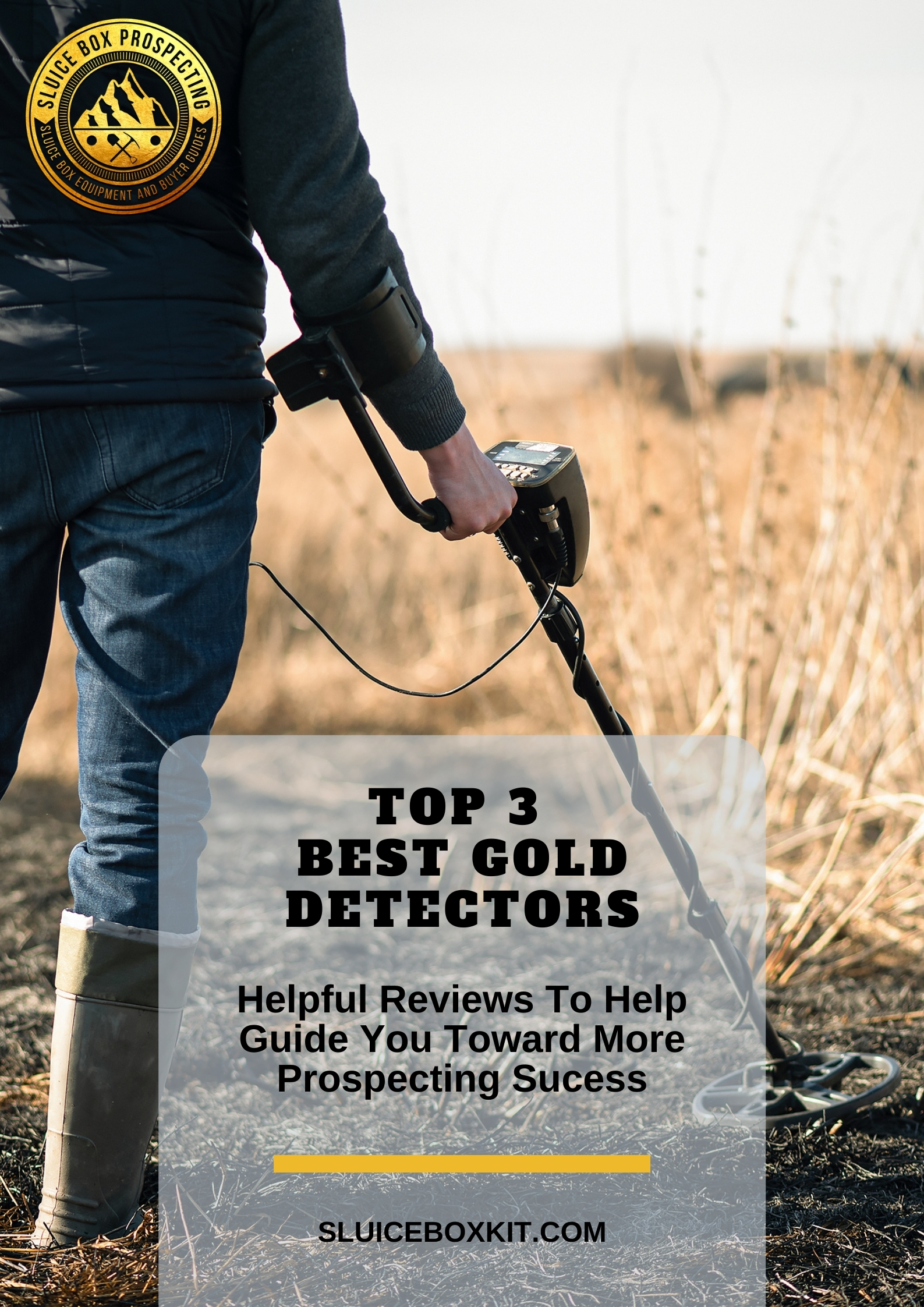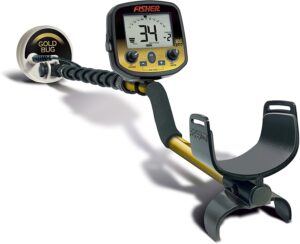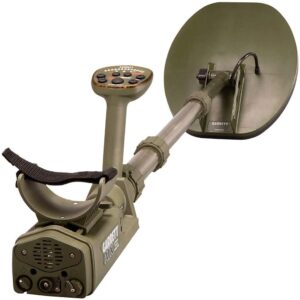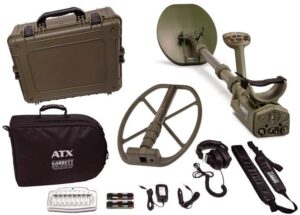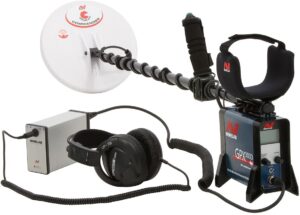The best gold detectors for prospecting will mostly depend on:
- How much money you are willing to spend
- Where do you plan to use it
- Discrimination Settings and Features
- Coil
Some metal detectors cannot be submerged in water, so you will want an underwater metal detector if you intend to prospect in streams and riverbeds. Other metal detectors are heavily affected by mineralization in the ground, so they may not be your best choice if you’re prospecting in hot ground.
The Best Gold Detectors For Prospecting Success
Table of Contents
Several gold detectors are available that are specifically for hunting gold nuggets, treasures, and relics. The top three options worth considering are:
- Fisher Gold Bug Pro
- Garrett ATX
- Minelab GPX 5000
The Fisher Gold Bug Pro Is An Entry Level Gold Detector
A good gold detector for the beginning prospector is the Fisher Gold Bug Pro. This machine is versatile enough to be used for either coin prospecting or gold prospecting.
Fisher Gold Bug Pro Metal Detector
Its excellent discrimination capabilities can help you quickly determine whether you’ve found trash or treasure.
Features include:
- Discrimination Mode
- All-Metal Mode
- No-motion Pinpoint
- Depth Indicator
- Threshold and Gain Controls
- Target ID and tone indicator
- Ultra-sensitive
- Signal strength indicator
This metal detector gives you an ongoing readout of ground conditions as you search. It constantly tells you the mineralization level in the current search area.
Operating at 19kHz, any metal that lurks up to five inches below the surface will be detected. The two-tone audio integrated into the Target ID system helps you decide whether to dig. The machine beeps a deep tone for ferrous metals and a higher tone for non-ferrous metals.
The ergonomic structure of this metal detector will allow you to prospect for hours without muscle strain. Weighing in at just two and one-half pounds, the Fisher Gold Bug Pro can work all day without wearing you down. It can easily handle the trashiest of areas, and the 5” coil can pick up on the smallest pieces of metal buried in the ground.
The price is perhaps a bit more than a beginner would prefer to pay, but it is worth the money if you’re serious about gold prospecting with a metal detector.
The Garret ATX Gold Detector Is For The More Experienced Detectorists
The Garret ATX metal detector is an intermediate instrument for the serious prospector. This machine is a Pulse Induction metal detector that can be submerged in water up to ten feet deep.
Garrett ATX Deepseeker with 11×13″ Closed DD Coil Package Plus 20″ Deepseeker Coil Metal Detector
Features include:
- 25 discrimination settings
- Motion and non-motion search modes
- Electronic pinpointing
- 11×13” Mono closed search coil
- Headphones
The Garrett ATX is a simple machine in terms of operation. While its high-tech capabilities, it has a user-friendly design that makes it perfect for the no-fuss prospector who wants to hunt for gold. The iron check function tells you whether it’s worth your time to dig or if your find is likely ferrous trash.
The non-motion setting allows you to pinpoint a target to know precisely where to dig. It also scans the ground and tells you which frequency is best for the search area. This ability helps to maximize your search results.
This detector is military-grade, so you can be sure it can handle any terrain you choose to explore, even saltwater. It weighs five and one-half pounds, so you may want to keep your prospecting trips short until getting used to the weight. This machine is a top-quality gold detector, and most owners insist that it is worth every penny.
Minelab GPX 5000 Is Top-Of-The-Line Gold Detector
The Minelab GPX 5000 is an expert gold detector with all of the bells and whistles.
Features include:
- MPS
- DVT
- SETA
- Eight timings
- RX Gain
- Automatic ground balance
- Customizable audio
- 11” DD coil
- 15×12 Mono loop coil
The MPS feature gives you a greater depth in hard soils while maintaining accuracy. This advanced feature will help you find even the tiniest flakes of gold. The SETA feature cancels out signals from electromagnetic fields so you can concentrate on target signals.
The auto ground balance continually adjusts your metal detector to the soil it is searching in real-time. You can change the audio settings to maximize your hearing level so you don’t miss any signals.
It runs on a Lithium-ion battery and is usually good for about 12 hours on a full charge. Wall and vehicle chargers come with the package. KellyCo Metal Detectors also offers a wide range of metal detector options with helpful reviews and descriptions for each one.
What Is The Difference Between Metal Detector Coils?
Gold prospecting with a gold detector means finding a good compromise between noise reduction and sensitivity; the coil has everything to do with this.
Primarily, you will work with one of two coil types:
- The mono loop coil
- The double D coil
These coils operate at different levels and determine how successful your search will be—size matters when it comes to search coils. The bigger the coil, the deeper it will penetrate the ground you are prospecting.
When you are gold prospecting with a metal detector, the coil you use depends on your preference. Let’s look at how these coils work and what that means for your prospecting success.
Monoloop Coils Find All The Gold
Monoloop coils are so named because they have only one loop of wire coiled around them in a single loop.
Signal transmission and reception both travel along with this one coil. These coils are extremely sensitive. They penetrate deep into even the hard grounds, and if gold is there, these coils will find it. The downside is that you get an awful lot of noise from interference because of their sensitivity.
The settings on your gold detector can help with this but you cannot eliminate them even with the most expensive metal detectors. Excessive noise is the price you pay for extreme sensitivity and maximum search depth.
Double D Coils Are Quieter
Double D coils have two loops of wire shaped like letter D’s placed back to back. One wire sends a signal while the other wire receives a signal. These coils are designed to reduce interference noise for a quieter search. Their reduced sensitivity means reduced search depth, resulting in a lot of missed gold.
Double D’s are not nearly as sensitive as a Monoloop coil of the same size. Nor will it penetrate to the depth that a Monoloop coil will reach.
If you intend to use a Double D coil with a gold detector, you may want to consider using a size larger than you usually would. This size may, in some cases, compensate for the reduced sensitivity and depth.
The technique you use while gold prospecting with a metal detector is just as important as equipment quality. You don’t necessarily need the biggest and the best metal detector. You may only need to maximize the one you have.
For more gold prospecting help and tips, check out the post: 9 Gold Detecting Tips For Finding More Gold With A Metal Detector

